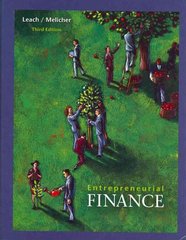Question
1. Freeman Corp. is considering investing in a project that will last three years. The project will require an immediate capital expen- diture of $600,000
1. Freeman Corp. is considering investing in a project that will last three years. The project will require an immediate capital expen- diture of $600,000 which will be depreciated to zero on a straight line basis. Freeman estimates that the revenues from this project will be $500,000 during the first year and that the revenues will grow at a rate of 10 percent per year. Variable costs are expected to be 50 percent of revenues each year, and fixed costs are ex- pected to be $20,000 per year. A one-time net working capital investment of $10,000 is required immediately and will be recov- ered fully at the end of the projects life. Freemans marginal tax rate is 35 percent. What is the IRR of this project?
2. Reeses Peanut Butter Cups, Inc. is planning to introduce a co- conut peanut butter cup which it will produce for five years. The initial cost of equipment will be $10,000, which can be depreci- ated on a straight-line basis over the life of the project. They will need an additional $1,000 of working capital immediately and that level of working capital will be maintained throughout the life of the project (no additional increases or decreases). The working capital will be recovered in full when the project ends. Based on the results of the recently concluded $2,000 market testing, sales of the new product are expected to be $5,000 per year. Variable costs for the new product are expected to be equal to 20 percent of the products sales, just as they are for the traditional flavor. There are no incremental fixed costs. The new flavor is expected to cause a $1,000 drop in sales of the traditional flavor during the first year, after which sales of the traditional flavor will recover to normal. What is the NPV of this project if the discount rate is 12%?
3. On reflection, Reeses CFO is concerned that 12% may not be the proper discount rate. Reeses has no preferred stock. It does, how- ever, have a series of 8 percent (coupon rate) bonds outstanding with a total principal value of $20 million. The bonds, which pay interest semi-annually, are currently priced at a yield to maturity of 8.40%. The companys stock is currently trading at a price of $40.34 per share, and there are two million shares outstanding. On average, if the stock market goes up 1%, Reeses stock goes up 1.2%. If the stock market goes down 1%, Reeses stock goes down 1.2%. You consider the risk-free rate of interest to be 3.0%. Over the past 100 years, the return on the stock market has averaged 5.7% better than the risk-free rate and you feel that is likely to continue in the future. Reeses marginal tax rate is 35%. What is the companys WACC? What is the NPV of the project in the previous question at this discount rate?
4. Sustef Enterprises has been considering the purchase of a new manufacturing facility for $1.4 million. The cost of the facility is to be depreciated on a straight line basis over seven years. It is expected to have no value after seven years. Cash flows from depreciation are considered to be risk-free, so they should be dis- counted at the risk-free rate. Operating revenues from the facility are expected to be $500,000 during the first year. The revenues are expected to increase by 3 percent per year during the seven- year life of this facility. No additional working capital investments are expected. Production costs during the first year are $200,000, and they are expected to remain at that level. Of course, pro- jected revenues and costs are only expected values, so they could be higher or lower than projected. The appropriate discount rate for risky cash flows is 8.7%, while the risk-free rate is 3%. The corporate tax rate is 35%. What is the NPV of this investment?
5. At a cocktail party, a friend requests your help. Your friend has been trying to explain to a third person (a French literature major who your friend is trying very hard to impress) how it is that investors in competitive capital markets actually can and do get the expected returns they require to compensate them for bearing the risk (although not all of it) associated with the assets they hold. The French lit major does not understand. Help me out here. How can I best explain it to her? your friend asks. How do you answer?
Step by Step Solution
There are 3 Steps involved in it
Step: 1

Get Instant Access to Expert-Tailored Solutions
See step-by-step solutions with expert insights and AI powered tools for academic success
Step: 2

Step: 3

Ace Your Homework with AI
Get the answers you need in no time with our AI-driven, step-by-step assistance
Get Started


